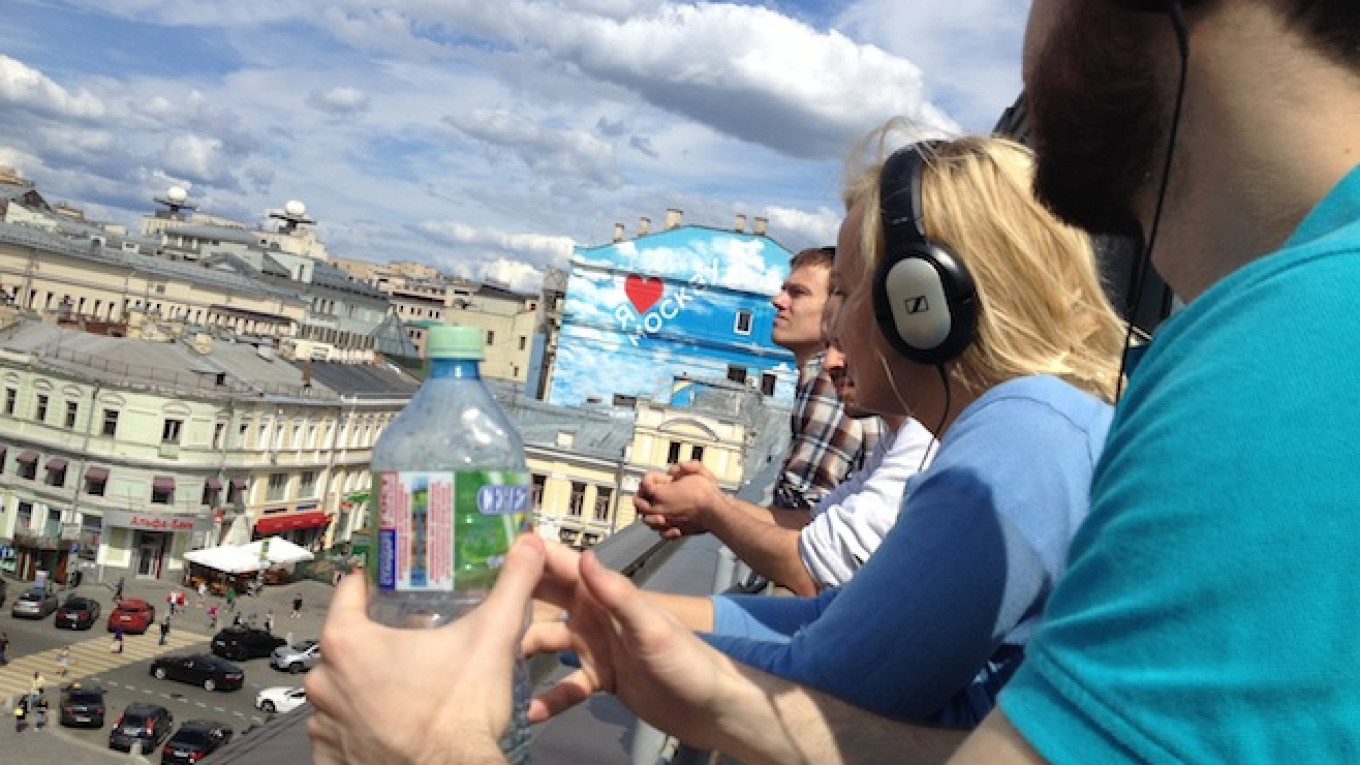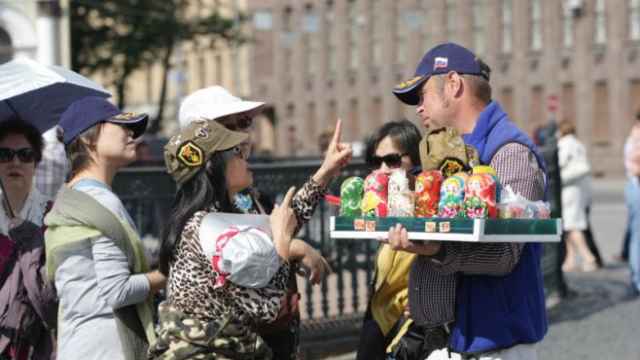Cemeteries are usually not a place for beginnings, but the Miusskoye Cemetery in northern Moscow is the meeting point for Remote Moscow excursions. From the outset, it's clear that this will be no ordinary tourist outing.
The small crowd I met at the cemetery gate on a sleepy June afternoon to take part in the excursion, described as a "promenade performance," was made up of a variety of young people — teenagers, bearded hipsters, 30-somethings in dubious leather sandals — but all wearing bulky headphone sets. The Remote Moscow excursion is part of an international project called Remote X, and it is the brainchild of Rimini Protokoll, a German art collective whose medium could be broadly described as sound theater. Remote Moscow was developed by the German creator of Remote X, Stefan Kaegi, and Russian impresario Feodor Elutine.
Participation in a Remote X excursion involves following a kind of aural scavenger hunt with clues broadcast through the headphones members of the excursion wear. But the process is not so straightforward. The journey is meant to force participants to explore their own ideas of society, individuality and acceptability as much as to explore a city.
At first, the Remote Moscow tour is guided by a slightly apologetic and metallic female voice who introduces herself as Milena. "I will try to be your friend," she says. Milena has no body and is aware her voice sounds, in her own words, "a bit weird." In addition to this insecurity about how she comes across, Milena has a penchant for deep philosophical disquisitions. "Everybody is the same in front of death," she proclaims while guiding the group across the cemetery. She then asks participants to pick a grave and observe it carefully. She guides the group through a series of reflections, asking questions about the age of the deceased, our age in relation to theirs, their physical appearance.
In the hour and a half to follow, Milena takes the group on a physical and spiritual journey across the city. Each of us is alone in the crowd, but through Milena we become a unit—or at least that is what she says. At times she leaves us free to choose our next move: go left or go right, walk up the metro escalator or wait for it to carry you to the top. She divides us into smaller groups and sends us our separate ways. But in the end we are all back together, actors in this surreal staged action.
The tour is dotted with a series of mini-flash mobs. As we go down the metro escalator, Milena tells us to pretend to be ballerinas. We execute a few ballet positions. Needless to say, people around look confused. So do the participants. Milena forces us to explore the awkward and the uncomfortable; we are pushed to stare people in the eyes and establish connections among each others. Walking down Tverskoy Bulvar in the city center, we are invited to sing a Russian song. Later, as we stand outside Moscow's fancy department store TsUM, we are instructed to start a party on the square. We are the only ones who can hear the music in our headphones.
It's not easy to trust this metallic voice.
When we arrive at the Vysokopetrovsky Monastery, Milena morphs into Yuri, a male voice with a vaguely misogynistic attitude. "Milena told me that sometimes she is jealous of your body because without one she can't wear shoes," he says. We slowly descend the stairs into the monastery's refectory. The walls are covered with beautiful frescoes. Small plates with Russian pies and cups of the fruit drink kompot are neatly aligned on the tables. Yuri tells us to help ourselves, yet the solemn tone of his voice prevents us from relaxing. I start examining the food for traces of poison. My neighbor looks at a cup with suspicion.
Back on the streets of Moscow, we venture into unexpected corners and back alleys, all the way into a basketball court. Yuri divides us in teams and coordinates an impromptu basketball match, imaginary ball included. In an attempt to get us to experience the meaning of democracy, Yuri orders us to stage a protest outside the building of the Prosecutor General's Office of the Russian Federation. This is not a country known for its love of spontaneous protests. I wonder if the group has gotten permission for the event. Could I end up in jail? Yuri doesn't seem to care.
The tour ends on the rooftop of TsUM. An "I Love Moscow" sign hangs on the next building. Yuri bids us farewell as we are encircled by a cloud of smoke. It's now time for a group photo. Smile! We are done.
Even though the group has spent the past few hours together, the participants remain strangers. And it is destined to stay that way. People rush to the exit. I stop two girls, Alina and Sasha. Alina has just turned 17, and the Remote Moscow excursion was her friend Sasha's gift for the occasion. "It's really an exciting experience. It showed to me that performance can be made in any type of form," Alina says in nearly impeccable English. "I was plunged into this atmosphere... It seemed to me it was another Moscow."
Later in the day as I stand on the metro platform I try one of the exercises I learned in Remote Moscow: staring someone intently in the eyes until they look away. The lanky hipster I choose for my experiment is fully equipped with four facial piercings, a beard and blue camouflage pants. I stare. He stares back. I linger, and so does he. Could he also have learned about the game during a Remote Moscow tour? Maybe. Or he might have simply felt like engaging in a staring contest.
A Message from The Moscow Times:
Dear readers,
We are facing unprecedented challenges. Russia's Prosecutor General's Office has designated The Moscow Times as an "undesirable" organization, criminalizing our work and putting our staff at risk of prosecution. This follows our earlier unjust labeling as a "foreign agent."
These actions are direct attempts to silence independent journalism in Russia. The authorities claim our work "discredits the decisions of the Russian leadership." We see things differently: we strive to provide accurate, unbiased reporting on Russia.
We, the journalists of The Moscow Times, refuse to be silenced. But to continue our work, we need your help.
Your support, no matter how small, makes a world of difference. If you can, please support us monthly starting from just $2. It's quick to set up, and every contribution makes a significant impact.
By supporting The Moscow Times, you're defending open, independent journalism in the face of repression. Thank you for standing with us.
Remind me later.






